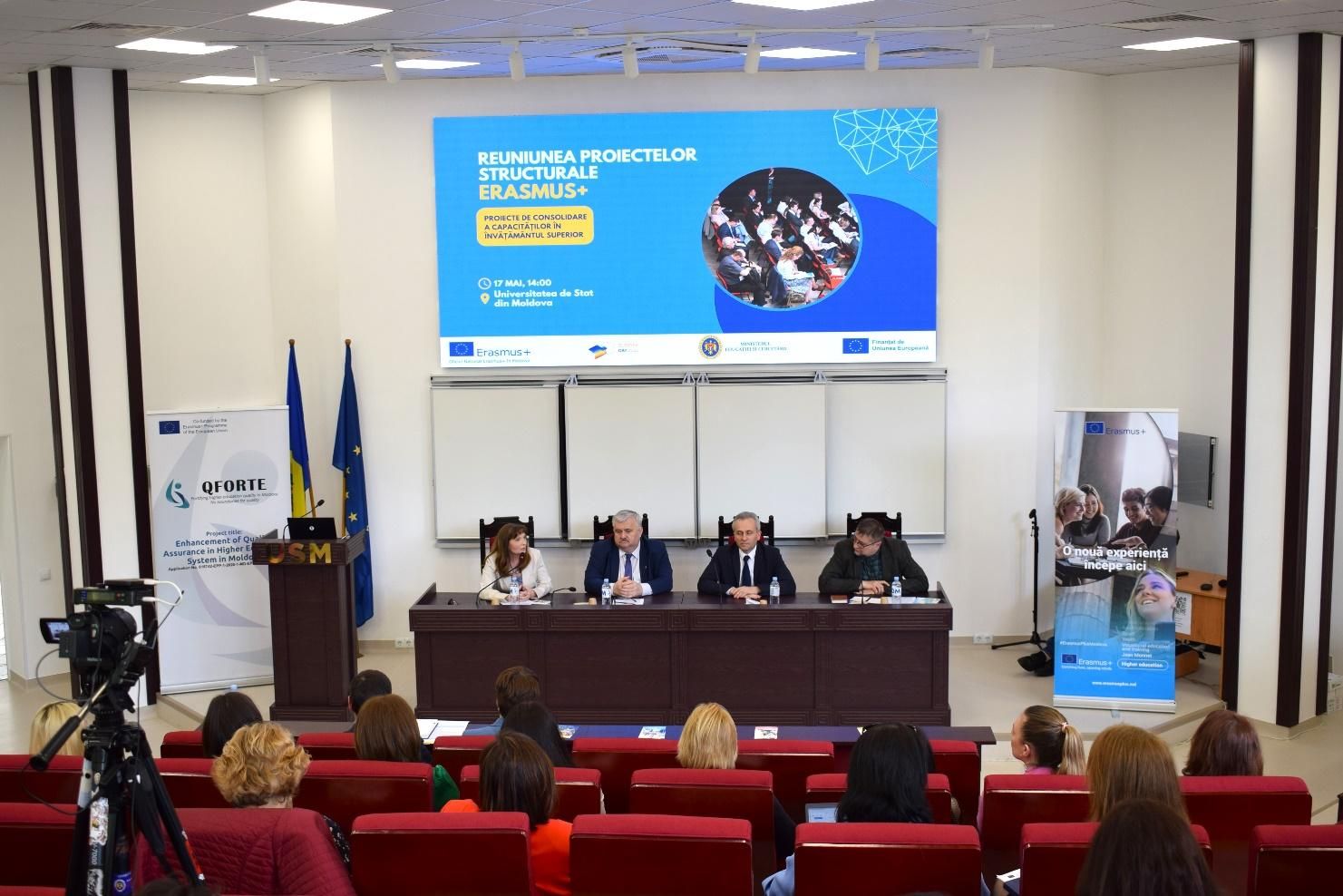Reunion of Erasmus+ structural Capacity Building in Higher Education projects implemented in Moldova

In light of the promotion of the results of the Erasmus+ Programme and on the occasion of the celebration of Europe Days, the National Erasmus+ Office, in cooperation with the Delegation of the European Union to the Republic of Moldova and the Ministry of Education and Research, has organised the Cluster Meeting dedicated to the national impact of structural Capacities Building in Higher Education projects (CBHE), implemented in the Republic of Moldova. The purpose of the event was to highlight the impact at the systemic level in the reform of higher education as a result of the implementation of eight CBHE structural projects, in a total budget of over 7.2 million euros.
The event took place on 17 May, 2023, at the Moldova State University.
The event was attended by the Minister of Education and Research in the Republic of Moldova, Anatolie Topală; the deputy in the Parliament of the Republic of Moldova and member of the Culture, Education, Research, Youth, Sport and Mass Media Committee, Virgiliu Pâslariuc; the rector of the State University of Moldova, Igor Șarov, as well as the secretary of state within the Ministry of Education and Research in the Republic of Moldova, Nadejda Velișco. Minister Topală highly appreciated the support offered to the educational system in our country by the European programmes: “I encourage academics and universities to develop structural projects necessary for the large-scale reforms that have been launched. The Ministry of Education and Research will support and appreciate the contribution of academics who implement projects through the new changes to the “Methodology of financing higher education institutions””.
The event brought together more than 50 representatives of academic and administrative staff, coordinators of Erasmus+ CBHE projects, but also beneficiaries of the Erasmus+ Programme from universities across all country.
Erasmus+ Capacity Building in Higher Education projects are transnational cooperation actions based on multilateral partnerships, primarily between higher education institutions in the programme countries (EU countries and 6 countries associated to the programme) and eligible partner countries (rest of the world, including the Republic of Moldova). The structural capacity building projects aim to have an impact on higher education systems and promote reforms at the national level in the Republic of Moldova.
The international consortia of seven of the eight CBHE structural projects, implemented in the Republic of Moldova, are coordinated by the higher education institutions from the Republic of Moldova. These consortia involved 39 universities from 16 European countries, along with 15 higher education institutions, the Council of Rectors, ANACEC, local enterprises and NGOs from the Republic of Moldova. All these projects include the Ministry of Education and Research of the Republic of Moldova as a partner, and pursue reform promotion objectives in very diverse areas of higher education: internationalisation (ELEVATE project), development of lifelong learning model (COMPASS), research management capabilities and open science (MINERVA), quality assurance (QFORTE), leadership and management of higher education (MHELM), dual education (COOPERA), work-based studies (WBL4JOB) and online education quality (MEDIA).
Therefore, these Erasmus+ projects have already managed to produce impact in the field of higher education, to train staff from Moldovan universities within European Union institutions, but also to technically equip higher education institutions in the Republic of Moldova.
During the years 2014-2022, the Erasmus+ Programme had a major impact on the development of higher education in the Republic of Moldova through its various projects, such as: over 800 international credit mobility projects, which involved about 4000 academic exchanges of students and academic staff, 24 capacity building in higher education projects and 27 Jean Monnet projects.